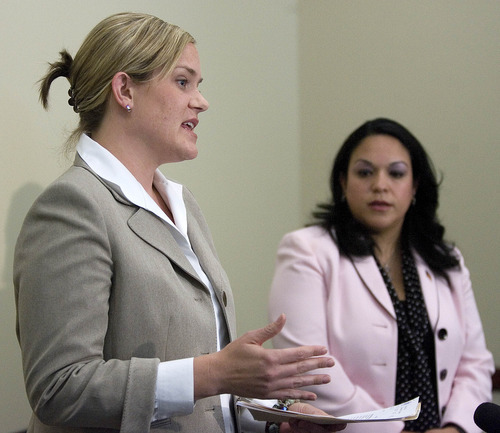This is an archived article that was published on sltrib.com in 2012, and information in the article may be outdated. It is provided only for personal research purposes and may not be reprinted.
Businesses providing immigration consulting services will be required to register with the state and face fines up to $5,000 for unscrupulous behavior, as Utah attempts to crack down on identity fraud and predatory practices that take advantage of immigrants and refugees.
Sen. Luz Robles, D-Salt Lake City, unveiled the law's requirements with Utah Department of Commerce Director Traci Gundersen on Tuesday at the state Capitol.
"We are trying to be as proactive as possible with this legislation," Robles said.
The law, signed by Gov. Gary Herbert, was the only immigration-related bill to emerge out of the Legislature this session and it takes effect July 1.
It could impact as many as 100 immigration consultants along the Wasatch Front alone — though Gundersen and Robles said they didn't have a good handle on how many will end up being registered once it goes into effect.
To comply, Gundersen said, immigration consultants would come to the Commerce Department office and submit a fingerprint card, criminal background check, a bond for $50,000, and an application fee, which is renewable on an annual basis.
"It gives us information as to who is acting as an immigration consultant in Utah and if we were to receive complaints from the public," Gundersen said. "So, for example, if we had someone who feels they were taken advantage of or they haven't been receiving written disclosures or they didn't get the documentation they needed from the immigration consultant, they would file a complaint with the division."
Immigration consultants are those who aren't lawyers but provide assistance to immigrants attempting to adjust their legal status for themselves or a family member — including someone who is in the process of becoming a citizen — by submitting forms to U.S. Customs and Immigration Services or to other federal and state agencies.
Robles said the predatory practices of immigration consultants in Utah usually start with duping those coming from Latin America by playing off the word "notary." In Spanish, "notario publico" are lawyers, not a notary public. Unscrupulous consultants used that to draw unsuspecting immigrants to pay thousands of dollars without providing the proper paperwork to adjust status.
Robles also said consultants acting in bad faith are the source of identity fraud in Utah.
She said they often have access to birth certificates and other forms of identification that can be sold to those peddling fake identities.
Rose Maizner, development director with Communities United, said her nonprofit was working with several groups to get information out about registering and training to comply with the new law.
Mark Alvarez, an immigration attorney, said he supported the legislation because he'd heard of immigration consultants offering to put illegal immigrants on waiting lists for a state-issued guest worker permit.
That permit, which is a key component in HB116, doesn't actually exist nor is there any waiting list for that law, which doesn't take effect until July 2013. Alvarez, along with the American Civil Liberties Union of Utah and legislative research lawyers, said HB116 is unconstitutional and likely could never go into affect anyway.
Alvarez said the biggest advantage to SB144 is the bond requirement.
That $50,000 could be used for restitution for those who are taken advantage of by immigration consultants, he said.
Gundersen said the cost of the program would be covered by the fees and fines generated by the law and they adjusted projections based on the 600 immigration consultants registered in California. The new law also provides a full-time Spanish-speaking investigator on staff to ferret out and look into complaints filed against consultants.
dmontero@sltrib.comTwitter: @davemontero —
Immigration Consultant Registration Requirements
Consultants required to provide written contract in English and Spanish
Three-day right-to-cancel contract
Violations with fines ranging from $100 to $5,000
Intentional violations are Class A misdemeanors with up to $10,000 fine





